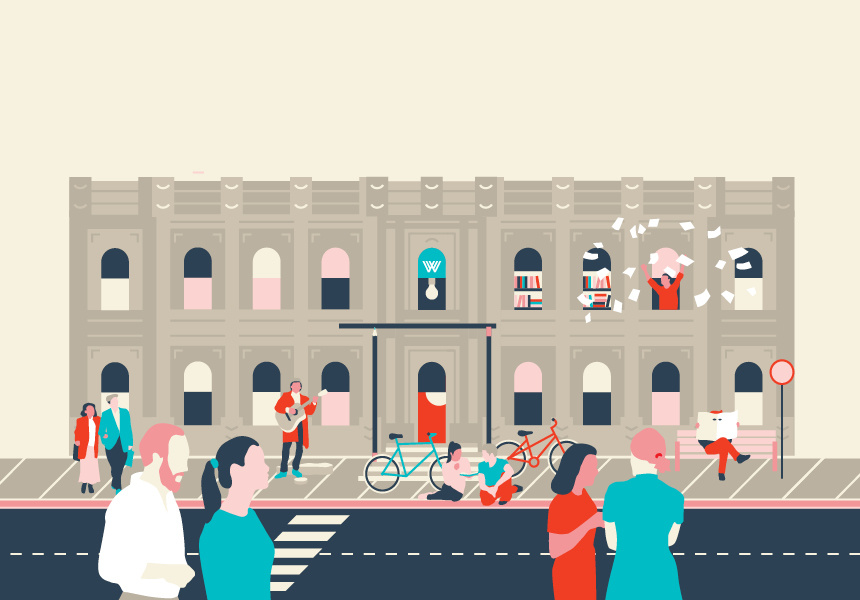Sometimes, as audience members are departing at the end of another Wheeler Centre event, Michael Williams likes to loiter in the foyer and listen to the passing conversations.
“I love standing at the back on the stairs as audiences leave, listening to them talk about what they have seen,” says Williams. “Sometimes in a slightly creepy way, reading a newspaper with eye-holes cut out of it.”
Self-mockery aside, the director of Melbourne’s Centre for Books, Writing and Ideas is dead serious about listening to the people who attend The Wheeler Centre’s massive program of events.
Stay in the know with our free newsletter. The latest restaurants, must-see exhibitions, style trends, travel spots and more – curated by those who know.
SIGN UPAnd it seems to be working. Since The Wheeler Centre launched in February 2010, more than 200,000 people have come through its doors, hearing from 1800 speakers at more than 1000 events.
Those events cover author talks, weighty political discussions, performances by singer- songwriter Paul Kelly and literary-themed speed-dating nights. And almost all of it is free.
It’s a place you can pop into at lunchtime or after work to hear from your favourite writer, or take part in a discussion about Melbourne crime fiction.
Huge names have appeared under The Wheeler Centre banner: Irvine Welsh, Germaine Greer, Tom Stoppard and Art Spiegelman, to name just a handful. Locals turned up in droves when Game of Thrones author George R.R. Martin spoke in 2013.
As its fifth birthday passes, it’s inevitable that questions are asked about the impact of The Wheeler Centre; not just on the city’s writers and broader literary community, but also the huge number of Melburnians who consume the everyday feast of ideas and discussion that the centre presents.
Melbourne Lord Mayor Robert Doyle likens The Wheeler Centre to a modern version of the Roman Forum, where people would gather for speeches, debates and even the odd gladiatorial match.
“It is something we didn’t know w as missing until we had it. And now we do, we look at it and say: ‘Y es, that’s exactly what we needed’,” says Doyle.
The Wheeler Centre was established in 2009 with an endowment from the founders of the Lonely Planet guidebooks, Tony and Maureen Wheeler, and funding from the then state government.
Williams explains that the centre has supported dozens of local writers, not just by showcasing their work, but also by ensuring that, if they appear at The Wheeler Centre, they get properly paid.
“It’s important that we recognise it is almost impossible to make a living as a writer in Australia off the income from your work alone,” he says. “So The Wheeler Centre makes it easier to work and live as a writer in Melbourne.”
Melbourne poet and writer Maxine Beneba Clarke is an example of an artist who has benefited from the financial and broader support provided by the centre to some of those trying to make a living from their craft.
“As a spoken-word poet, funding is always difficult, at times impossible, to come by,” says Beneba Clarke, who appeared regularly at The Wheeler Centre last year and also won the 2013 Premier’s Literary Award for best unpublished manuscript for her debut short-story collection, Foreign Soil.
When considering how The Wheeler Centre could still improve, Williams points to the fact that although discussions in languages other than English have been presented on occasion, the issue of accessibility is still a work in progress.
“I don’t think we are offenders (in this area), but I also don’t think we are leaders yet, either. And I’d like us to be.”
Williams also acknowledges a broader concern: that The Wheeler Centre’s growing success has the potential to take business away from other players in the literary community, particularly bookstores.
But he dismisses suggestions the centre is in danger of becoming a behemoth, swallowing all in its path.He points out that it shuts down every year during the Melbourne Writers’ Festival, to ensure the MWF gets its annual place in the sun.
“When we started, there were already lots of public talks going on that were good, lots of other people working in the space who were doing great work. It has always been about how we can add to and build on that, rather than compete with it,” he says.
He’s backed up by celebrated Melbourne author Shane Maloney, who says that other entities in Melbourne’s literary and cultural scene have nothing to fear, and much to gain, from the rise of The Wheeler Centre.
“This is not a squabble for market share. The Wheeler Centre is part of an ecosystem of ideas,”says Maloney.
“It is a big fish in the ecosystem, but it’s not the only fish and never will be the only fish.”
Williams believes the criticisms come from a strong sense of ownership over the centre, which can sometimes manifest as tough love from some quarters.
“People – writers, readers, members of the public – feel a personal stake in us getting it right,” says Williams.
“And they should feel that sense of ownership. And they should complain to us when we get it wrong, which we will. That’s great. That means we’re here. It means we are their Centre for Books, Writing and Ideas.”
Williams can point to past mistakes: A proposed debate last year about Israel and Palestine almost became the first-ever Wheeler Centre event that had to be cancelled due to boycott threats by participants.
“We went for that topic because it bothered us that it seemed like it was in a too- hard basket. And there were points in the lead up when we seriously considered putting it back in the too-hard basket.”
In the end the debate was re-cast as a successful panel discussion on the difficulties of talking about the issue.
This year the centre has changed the way the program will be announced, to give it more flexibility to respond to big issues. Speakers already announced include Tasmanian author Richard Flanagan in his first public interview since winning the Man Booker Prize, novelist Michel Faber and environmental journalist Simran Sethi. There’s a new festival of ideas that will happen later in the year but which is still under wraps (“It’s all about the asking and answering of questions,” is all Williams will say).
He says the challenge is to keep listening to the people who come through the centre’s doors, to keep experimenting, to keep carving out a unique place in Melbourne’s crowded cultural landscape.
“This is the best job that I can imagine,” he says. “The only problem with having the best job you can imagine is making sure you do it justice.”
The Wheeler Centre
176 Little Lonsdale Street, Melbourne
(03) 9094 7800


